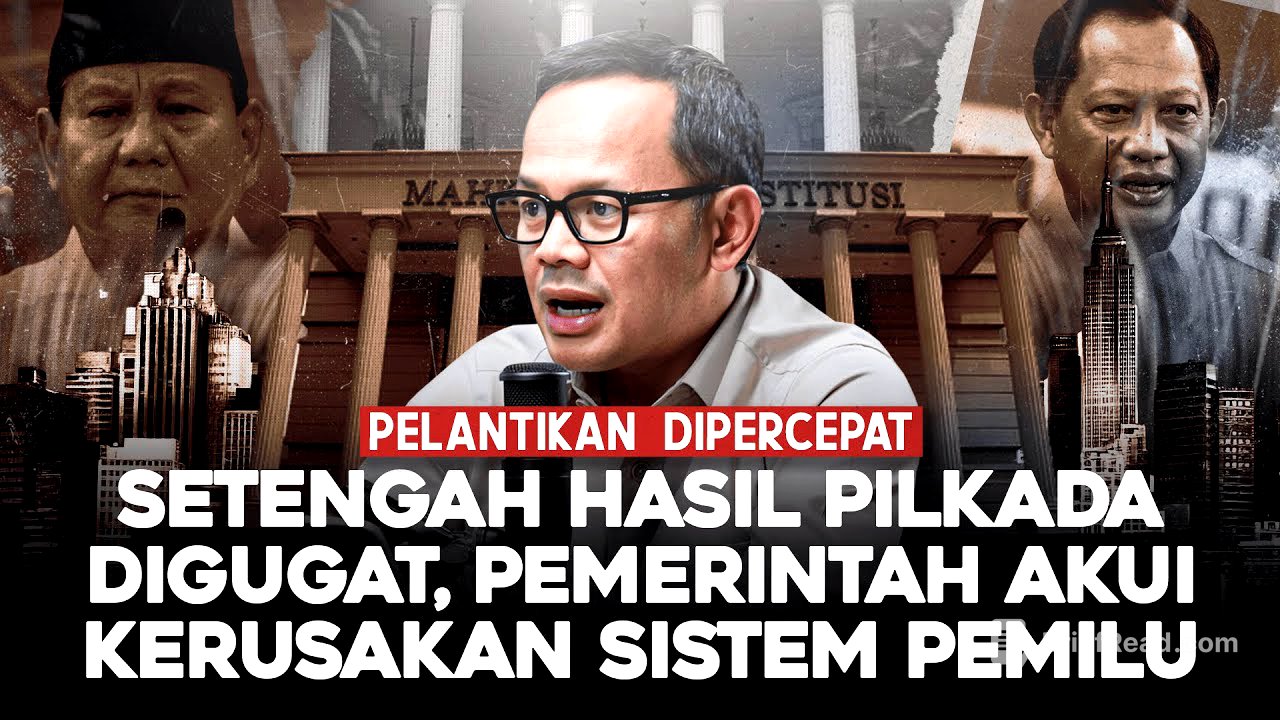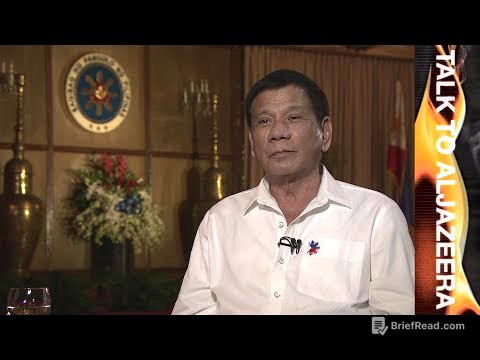TLDR;
This video features a conversation between Akbar Faizal and Vice Minister of Home Affairs, Bima Arya Sugiarto, focusing on the latest political developments in Indonesia, especially those related to the 2024 elections and future reforms. They discuss the postponement of regional head elections, potential issues with the MK (Constitutional Court), and the government's plans to address problems like money politics and neutrality violations. The conversation also touches on the extension of village heads' terms and the progress of the IKN (New Capital City) project.
- Postponement of regional head elections due to MK disputes.
- Government efforts to address money politics and neutrality violations.
- Discussion on the extension of village heads' terms.
- Updates on the IKN project and its future.
Opening Remarks and Political Context [0:00]
Akbar Faizal opens by reflecting on the long series of political events since the February presidential election, including the regional elections on November 27. He notes that despite these events seemingly concluding, the Constitutional Court (MK) is still in session, addressing numerous lawsuits. Faizal mentions that approximately 80% of the 200+ lawsuits have been dismissed, proceeding only to the document review stage without witness examination.
Postponement of Regional Head Elections [1:53]
Akbar Faizal discusses information he received about the government and the DPR (House of Representatives) setting a date for the inauguration of governors, regents, and mayors on February 20. He then introduces Bima Arya Sugiarto, the Vice Minister of Home Affairs, to confirm the accuracy of this information. Bima Arya explains that the simultaneous regional elections aim to align government periods for better coordination and planning between governors, regents, mayors, and the President. However, inaugurations cannot be simultaneous due to ongoing disputes at the MK.
MK's Decision and Inauguration Timeline [3:50]
Bima Arya elaborates on the MK's decision to prioritize simultaneity, with exceptions for repeat elections. He mentions that the Ministry of Home Affairs, after consulting with various bodies including the KPU (General Elections Commission) and Bawaslu (Election Supervisory Body), initially planned to inaugurate unopposed regional heads on February 6. However, the MK expedited the dismissal process, moving it from mid-February to February 4-5. This acceleration led the Minister of Home Affairs to consult with the head of the MK and other officials, deciding to consolidate the inaugurations to avoid holding two large-scale events.
Challenges and Considerations in Inauguration Process [6:50]
Akbar Faizal and Bima Arya discuss the challenges of balancing legal processes with the need for timely governance. Faizal raises concerns that expediting the dismissal process might lead to oversights or a lack of thoroughness in the MK's considerations. Arya assures that the MK has its own calculations and data, leading to the expedited process. He notes that most dismissed cases involve significant vote differences, failing to meet the requirements for structured, systematic, and massive violations. The Ministry of Home Affairs is coordinating with the KPU and DPRD (Regional People's Representative Council) to expedite the process, aiming for inaugurations around February 20, with the possibility of an earlier date.
Analysis of Election Disputes and Improvement Efforts [11:59]
Akbar Faizal questions the high number of regional election disputes brought to the MK, with 249 out of all regions involved. Bima Arya attributes this to various factors, including alleged violations of neutrality, bias from incumbents, and misuse of authority. He mentions a case in Banjar Baru where a candidate was disqualified for using a favorable tagline. Arya emphasizes the ongoing efforts to codify election laws, aiming to address issues like money politics, lack of neutrality among organizers, and vote manipulation. The goal is to implement comprehensive system improvements rather than a single solution.
Addressing Key Issues: Bansos and Law Enforcement [15:29]
The discussion shifts to specific issues such as social aid (Bansos) and law enforcement (APH). Arya notes that during discussions in Commission II, there were calls to halt Bansos from the state budget. He explains that while stopping Bansos aims to level the playing field, it also creates a "prisoner's dilemma" where everyone is wary of others potentially violating the rules. Arya also mentions ongoing efforts to ensure the neutrality of election organizers and improve recruitment processes. He highlights the importance of law enforcement in upholding election integrity, noting that even the best systems are ineffective without proper enforcement.
President Prabowo's Commitment to Reform [19:25]
Akbar Faizal inquires whether President Prabowo Subianto supports the efforts to reform the political system and address issues like Bansos and APH involvement. Bima Arya affirms that President Prabowo is deeply committed to prioritizing the welfare of the people and ensuring efficiency. He notes that the President constantly reminds the cabinet of their mission and provides strong support for their efforts. Arya believes that the design of the future system will mitigate potential problems, and that advancements like e-voting could minimize fraud.
Specific Reform Proposals and Challenges [23:12]
Akbar Faizal presses for specific reform proposals, such as regulations on Bansos and APH involvement. Bima Arya provides examples of inconsistencies between election and regional election laws, such as differing penalties for money politics. He suggests increasing the authority of Bawaslu and implementing sanctions for violations, such as disqualification from future elections. Arya emphasizes that the revision of election laws is currently under discussion in Commission II, with the goal of opening it up for public input.
Potential Models for Election System Reform [25:14]
Bima Arya discusses potential models for election system reform, including separating national and local elections. One option is to hold presidential and parliamentary elections separately from regional and DPRD elections, creating a "local election" system. He also mentions proposals to lengthen the gap between elections, with some suggesting a two-year interval. Arya notes that President Prabowo is likely to play a significant role in determining the final format of the election system.
President Prabowo's Priorities and Vision [27:04]
Bima Arya shares insights from a meeting with President Prabowo, where the President emphasized two key priorities: Papua and reforming the election system. Prabowo expressed concerns about the high costs, inefficiency, and wastefulness of the current election system. He suggested exploring the possibility of returning to indirect elections for regional heads through the DPRD. Arya notes that this proposal has both pros and cons, requiring careful consideration of democratic principles and the potential for money politics within the DPRD.
Reflections on Past and Future Political Landscape [29:03]
Akbar Faizal reflects on the long-standing issues in Indonesian politics, expressing frustration that many of the same problems persist despite years of discussion. He mentions issues like TNI, Polri, and civil servants using their voting rights, and the high costs of elections. Faizal hopes that Bima Arya and the Minister of Home Affairs can resolve these issues under President Prabowo's administration.
Assessment of Election Safety and Future Improvements [30:31]
Bima Arya acknowledges the complexities and potential problems in the election system but highlights that data shows relative safety and control during the elections. He notes a decrease in fatalities compared to previous periods and mentions that public appreciation for security measures is high. Arya emphasizes the need to address issues like money politics and neutrality violations while appreciating the nation's adaptability to various systems. He also discusses the potential for e-voting, emphasizing that the main challenge is building trust in the technology and institutions involved.
Trust in Institutions and the Path to E-Voting [33:40]
Akbar Faizal raises concerns about the lack of trust in institutions, which hinders the adoption of e-voting. Bima Arya agrees that neutrality is crucial for building trust and mentions past systems where all parties were represented in the KPU. He notes that reforms might also affect the structure of election organizers, with proposals for ad hoc rather than permanent bodies. Arya emphasizes that a trusted election organizer is essential for moving towards e-voting.
Call for Innovative Solutions and E-Voting Advocacy [35:28]
Akbar Faizal expresses his lack of confidence in the current election organizers and calls for more innovative solutions. He offers to provide a platform for discussing and promoting e-voting, suggesting that technology can help overcome long-standing problems. Bima Arya mentions that Bappenas (National Development Planning Agency) has recommendations for promoting technology in elections. He encourages collaboration and welcomes proposals for e-voting systems.
Concerns About Village Heads and Dana Desa [37:05]
Akbar Faizal expresses concern about the extension of village heads' terms, finding it disturbing. Bima Arya acknowledges the issue and emphasizes the importance of overseeing the use of village funds (Dana Desa) and coordinating between law enforcement and village heads. He notes that villages are receiving more funds and stresses the need for transparency, accountability, and capacity building. Arya mentions that the Ministry of Home Affairs supervises through the Directorate General of Village Government, while funding comes from the Ministry of Villages.
Progressive Measures and Dana Desa Misuse [39:52]
Akbar Faizal expresses his desire for more progressive action to address the issues with village heads. Bima Arya mentions that the Minister of Villages, along with the police and law enforcement, are working to ensure that village heads do not misuse Dana Desa funds. He notes instances where Dana Desa funds have been used for illegal activities like gambling.
Presidential Inauguration of Regional Heads [40:26]
Akbar Faizal discusses the possibility of President Prabowo inaugurating regional heads, which he believes would be a prestigious and meaningful gesture. Bima Arya confirms that many regional heads have expressed their desire to be inaugurated by the President. He explains that the Ministry of Home Affairs found legal grounds in Law Number 10 of 2016, which states that the President "may" inaugurate governors, regents, and mayors simultaneously. President Prabowo has agreed to this, and the inauguration is planned to take place at the State Palace, though the specific location (Jakarta or IKN) is still under consideration.
IKN Progress and Future Plans [42:27]
Akbar Faizal raises concerns about the progress of IKN, noting that the presidential decree has not yet been issued. Bima Arya clarifies that while the legal framework is still pending, it is unlikely that government offices will relocate to IKN until the necessary infrastructure, including the DPR and Supreme Court buildings, is complete. He mentions that the presidential decree will likely align with the readiness of these institutions. Arya confirms that the IKN project is ongoing, with plans to relocate around 2028 once the necessary infrastructure is in place.
Concluding Remarks and Gratitude [44:51]
Akbar Faizal thanks Bima Arya for providing certainty and information. He acknowledges the challenges ahead but expresses hope that the discussed reforms will be implemented. Bima Arya thanks Akbar Faizal and the audience for their attention.









